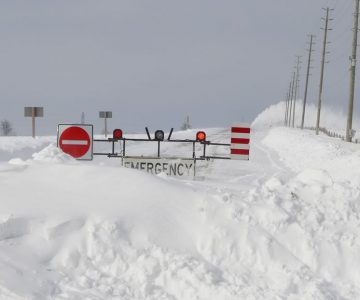Emergency Preparedness Checklist
Handy lists for the items you’ll need and the steps you’ll want to take before you hunker down at home or hit the road in an emergency.
In an emergency it may take personnel some time to reach you and your family. Prepare to be self-sufficient for a minimum of 72 hours or to leave home quickly, a packing list at the ready, and bags easy to locate and carry. Remember personal ID, laptops and cell phones with cords and external battery chargers, contact info for family, friends, school, daycare and hospital.
If a wind or ice storm is imminent, be ready for a blackout. Turn up the heat in advance. Consider investing in a generator and portable propane heaters to ensure you don’t find yourself sitting in the cold and dark wishing you had. Remember to test your generator at the beginning of the season and make sure you have a good supply of propane.
A camp stove or barbecue grill with a full propane tank will be a mealtime game changer, but don’t use them indoors. Toxic gases can build up with deadly consequences. If you are rural and on a well, your pump won’t work and toilets won’t flush when the power is out. Fill a few jugs of drinking water beforehand, then fill the bathtub and have a pail handy for washing and flushing.
You should already have (but probably don’t) a working fire extinguisher, which you know how to use without reading the label, on every level of your home. Ditto working carbon monoxide detectors and fire alarms (change the batteries annually), a dedicated first aid kit and well-marked shut-off valves for water, gas and electricity.
Also, when things go dark, check on neighbours, especially the elderly, to make sure they’re secure.
Hunkering down at home? Have handy:
- flashlights – the more the merrier (crank-type or lots of spare batteries)
- lots of candles or oil lamps and matches
- bottled water (minimum two litres per person)
- food – non-perishable (tinned, dried, energy bars, etc.) and don’t forget the pet food
- portable radio – crank-type or with even more spare batteries
- a deck of cards and board games. It’s screen-free family time!
Had enough? Scarpering? Take with you:
- change of clothes and footwear
- bottled water, non-perishable food (see above)
- utensils (can opener!), garbage bags, condiments
- portable radio – crank type or even more spare batteries
- prescription medications, for pets’ too
- basic first aid kit and whistle
- toiletries, toilet paper (you can’t have too much) and hand sanitizer
- cash, in small bills, plus coins for vending machines!
- tools: screwdriver set, pliers, multi-bladed knife, duct tape
- spare house keys and car keys.
In your vehicle, have on hand:
- water, non-perishable food (energy bars, etc.)
- boots and a change of clothing
- sleeping bag or warm blankets
- first aid kit
- flashlight and portable radio (more spare batteries, or crank-type)
- candles (for light and warmth) with tin can holder, matches.
- road maps, road flares, salt or kitty litter (for traction), shovel
- jumper cables, tow rope, extra antifreeze and washer fluid
- list of contacts for family, friends, schools, daycare, hospital, etc.
More stuff you probably haven’t done – yet:
- Prearrange release of children to designated persons from school, daycare or clubs in case you can’t get there to pick them up.
- Designate a safe meeting place for household members outside your home, community or area if you or they can’t get home.
- Draw a floor plan of your home and practise main and alternative escape routes. Apartment dwellers, plan stairway exits instead of elevators. Plan – and practise! – an escape route and alternative from your neighbourhood.
Related Stories

Ready or Not, Winter Storms Are on the Way
Nov 22, 2019 | | EnvironmentHowling blizzards, ice storms, power outages. Emergency services are on high alert, but when disaster strikes, the first line of defence is you.








